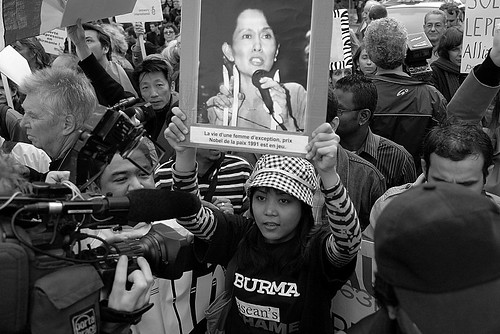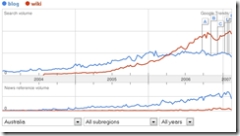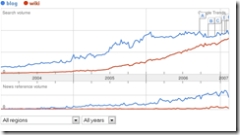Home » wiki (Page 4)
Category Archives: wiki
Links for May 27th 2008
Interesting links for May 25th 2008 through May 27th 2008:
- Death knell for television as we know it [The Age] – “Japanese television technology that will give viewers access to high-speed broadcasts over the internet could render conventional television obsolete and transform the media landscape within years, analysts have predicted.”
- Owning the Clouds [how now, brownpau?] – A worrying look at the way Google’s copyright takedown system favours big media over amateur production by letting derivative works (initially) send takedown notices to the original authors!
- HSC students to get Wikipedia course [The Age] – In an Australian first, NSW HSC students will from next year be able to take a course in studying Wikipedia, the online collaborative encyclopedia. Wikipedia,… has been listed by the NSW Board of Studies as prescribed text for an elective course…”
- Joss Whedon Fans Jump the Gun [NewTeeVee] – “Perhaps still smarting from their precious Firefly being killed off so soon, Joss Whedon fans are already mobilizing to save his next show, Dollhouse? before the first episode airs.”
Blogging Burma
Like the Asian Tsunami (December 29, 2004),the The London Bombings (July 2005) and Hurricane Katrina’s Aftermath (September 2005), information about the current demonstrations and atrocities happening in Burma are flowing through user-generated channels as much (indeed, often more so than) through the traditional mainstream media. There is a great deal of activity both in blogs and throughout the broader sphere of citizen media, but some noteworthy places to look are:-
[X] The 2007 Burmese anti-government protests Wikipedia entry – Wikipedia is at its most useful during moments of crisis which have many sets of eyes watching. The collective intelligence of Wikipedia contributors continues to develop one of the best resources on the Burma protests.
[X] YouTube has a number of clips like this one which simply show the enormous scope of the protests [Via]. A very good source is the videostream from news6776 which collates a great deal of footage (both mainstream media-produced and from citizen journalists)
[X] The Support the Monks’ protest in Burma Facebook Group – To be honest, I’ve never really thought Facebook would provide a terribly useful platform for political activism as the ‘groups’ often seem a peripheral part of Facebook’s design. However, I happily stand corrected as the exponential growth of the Support the Monks’ protest in Burma Facebook Group has been amazing – over 170,000 members when I checked this morning – and the links, advice and descriptions of how members can actively support the Burmese demonstrations in that group seems quite robust to me, not just a tokenistic gesture. Indeed, I’d go so far as to say this Facebook group has probably done more to promote the ‘ Day of International Action for a Free Burma – Free Aung San Suu Kyi & Support the Monks in Burma’ on October 6th than any other single outlet online or offline.
[X] The SmartMobs blog notes that cameraphones and other mobile devices are one of the main tools allowing information and media to get out of Burma, but the government has moved from shutting down Internet Cafes to blocking the entire internet in order to try and stop knowledge about the situation in Burma being available internationally. Taking the massive step of blocking the entire internet speaks volumes to how widely the impact of citizen reportage is from inside Burma is disseminating to international viewers and readers.
[X] For a traditional media rundown of the impact of citizen media, see ‘Bloggers in Burma keep world informed during military crackdown’ in the San Francisco Chronicle and Dan Gillmor’s response at the Centre for Citizen Media where he points out, quite rightly, that there’s a lot more than just blogging going on!
[X] Finally, you should visit Free Burma (dot Org) which is a portal for international information on how to support the protestors and get involved in their struggle.

[Photo by Hugo*’s from protestors supporting the Burmese democratic protests, in front of the Myanmar embassy in Paris, with a portrait of Aung San Suu Kyi.]
Australian Politicians … editing Wikipedia and spending big on redundant Internet filters
(I’m back in Perth, and …) All over the world the WikiScanner has been uncovering interesting trails and tails of previously unnamed Wikipedia editors. PerthNow quickly jumped on the bandwagon and discovered the the Office of Australia’s Prime Minister has been busy:
The Prime Minister’s staff has been editing Wikipedia to remove details that might be damaging to the Government in the lead-up to the election. Staff in the Department of Prime Minister and Cabinet have made 126 edits on subjects ranging from the children overboard affair to the Treasurer Peter Costello, Fairfax reports.
So, too, has Australia’s Department of Defense, although they’ve gone into Wiki lockdown while the Department figures out exactly who was changing what (or working out how to spin that story, at any rate). The PM’s office have supposedly launched an internal inquiry, but I’m sure any interesting findings (whatever that might entail) won’t quite surface until the 07 elections are done, anyway!
At the same time, the long-awaited Federally-funded NetAlert website, which is supposed to educate and arm parents, children and teachers to the dangers of life in a networked culture, has finally been released. Sadly, though, the keystone of NetAlert are free family internet filters, which have been poorly received and for the most part, don’t appear to work.
PS Running WikiScanner past the University of Western Australia IP Address is far less exciting; there is one big Portishead fan, a few rants about masturbation, but that’s the juiciest we’ve got!
Update: Australian Foreign Affairs Minister Alexander Downer takes the cake with his thoughts on Wikipedia:
“My sort of recollection of Wikipedia sites is they are a bit, sort of, a bit anti-government, they are sort of a bit negative about people in the government,” Mr Downer said today. “That is my recollection of them, so maybe we should fire people up to edit them – but I know they have editorial control at Wikipedia so it probably wouldn’t help.”
It’s such a delight to have such informed politicians leading this country. *sigh*
Searching Blogs Vs Wikis – Australians Prefer Wiki (The World Prefers Blog)
I was playing with Google Trends and their comparison function and noticed that you can now limit searches to regions (ie just Australia, for example). I was playing around looking at the comparative popularity of ‘blog’ versus ‘wiki’ and found something interesting: cumulatively, global searchers are still typing in ‘blog’ more, but in Australia, ‘wiki’ is a more popular term, and has been since the third quarter of 2006. Since there’s no scale on Google Trends, I’ve no numbers attached to these trends, but the results are interesting nevertheless.
Australia is looking for wikis…
While the world is looking for blogs…
[Click either image to expand.]
I’ve no idea why wikis are more popular in Australia … perhaps something to do with Wikipedia? I note in the News trends (the smaller bottom graph), blogs are still mentioned a lot more in the mainstream media. I wonder what it is about wikis and Aussies?



